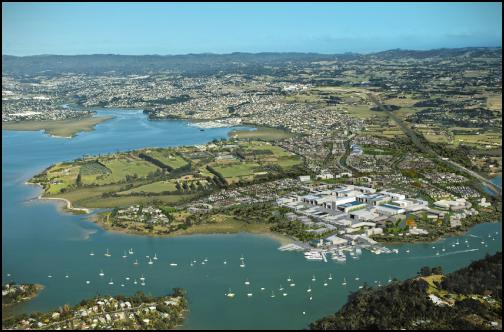Sell-down part of next phase at Hobsonville Point

Click for big version.
Some seven hectares of development land up for sale at Hobsonville Point in Auckland will increase the availability of new home building sites in the city.
Media Release
1.7.2013
Waterfront and heritage homes sell-down part of next development phase at Hobsonville Point
Builders and developers are being given the opportunity to become part of one of New Zealand’s largest residential projects - with the sale of large development sites in the next phase of expansion at Hobsonville Point in Auckland.
The blocks, in what is known as the Sunderland Precinct at Hobsonville Point, overlook the upper reaches of the Waitemata Harbour, and are being sold in five individual titles, covering more than seven hectares in total, zoned for a mix of stand-alone and medium density housing.
The five blocks range in size from a 3600 square metre site that includes Mill House, a large house pre-dating the Hobsonville air force base, through to a bare 3.6 hectare development parcel.
Combined, the blocks have the potential to accommodate between 144 to 278 new residences – in combinations of standalone, semi-detached, terraced dwellings or apartments.
The development land is being sold by Hobsonville Land Company Limited (HLC), the lead developer of Hobsonville Point, and a Crown owned entity. Marketing of the five residential blocks and adjoining commercial premises is being conducted by Bayleys Real Estate through a registration of interest process closing on August 8.
Hobsonville Land Company commercial manager Mark Fraser said the release of five new residential blocks would enable additional mixed intensity housing - including some higher value homes - to begin earlier than previously anticipated.
Mr Fraser said the first precinct of 690 homes at Hobsonville Point had progressively been sold to building companies since 2011, and was currently the scene of intense home building activity.
“These builders are enjoying very strong house sales and will be more than 50 percent sold by the end of the year,” he said.
Some 200 dwellings have been built or are nearing completion in the first precinct of Hobsonville Point, with an even greater number due for completion in the coming year, Mr Fraser said. From 2014, the number of homes being completed annually was expected to grow to between 250 -300 dwellings.
Bayleys Real Estate salesperson Michael Pleciak said that by offering the 7.4 hectares at Hobsonville Point in five parcels, smaller developers would have an opportunity to compete to be part of one of New Zealand’s largest residential developments.
“The five parcels can be tendered for in any number of combinations. For example, one developer could bid for all five blocks, or five developers might each tender for one parcel each.” he said.
“The exceptional demand for sites within the first phase of residential development at Hobsonville Point gives considerable confidence to developers of the second phase that there is substantial on-going demand for housing stock in the community.”
He said construction of homes on
these new development sites could potentially begin as early
as 2015. Utility services such as power and
telecommunications cabling, roading and street lighting had
yet to be laid in the five residential blocks and would
follow the sale process.
Mr Pleciak said state-of-the-art
infrastructure at Hobsonville Point community was
progressing at a phenomenal rate – with the primary school
already open, the secondary school currently under
construction and due to open for the first term of next
year, a retirement village operator signed on to run a
planned 145 unit facility, the first apartment project
confirmed, and initial talks being held with operators
looking for neighbourhood retail opportunities including a
corner-store.
When complete, Hobsonville Point will
contain up to 3000 residential dwellings, and provide homes
for around 8000 people.
“What we are seeing at Hobsonville Point is a social phenomenon - the creation of an entire suburb, complete with social infrastructure, in what will be the space of a decade. That’s far faster by comparison than the evolution of either Albany or Dannemora/Botany for example which both took considerably longer to mature,” Mr Pleciak said.
ENDS


 ASB Bank: ASB Business Survey - The Impact Of Trump's Tariffs, According To Kiwi Businesses
ASB Bank: ASB Business Survey - The Impact Of Trump's Tariffs, According To Kiwi Businesses University of Auckland: Will Robots Help Older People Stay Sharp?
University of Auckland: Will Robots Help Older People Stay Sharp? Electricity Authority: Authority Confirms New Next-Gen Switching Service; Proposes Multiple Trading Relationships For Consumers
Electricity Authority: Authority Confirms New Next-Gen Switching Service; Proposes Multiple Trading Relationships For Consumers Mānuka Charitable Trust: Mānuka Charitable Trust Warns Global Buyers Of Misleading Australian Honey Claims
Mānuka Charitable Trust: Mānuka Charitable Trust Warns Global Buyers Of Misleading Australian Honey Claims  Engineering New Zealand: NZ Building System Needs Urgent Improvement
Engineering New Zealand: NZ Building System Needs Urgent Improvement GNS Science: Bioshields Could Help Slow Tsunami Flow
GNS Science: Bioshields Could Help Slow Tsunami Flow


